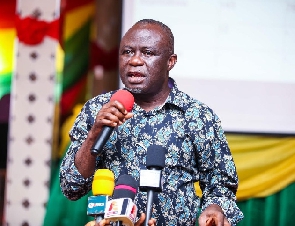The sustainable growth of the agricultural sector is critical in driving economic transformation, Deputy Minister for Food and Agriculture in charge of Crops, Yaw Frimpong Addo, has said.
With Ghana’s population estimated to increase by 4.3million people between 2022 and 2027, he said a well-developed agricultural industry will continue to play a crucial role by providing food and jobs to stimulate economic growth.
The sector currently employs over 45 percent of the population and contributes about 21 percent of gross domestic product.
Despite this, low on-farm productivity and production; poor availability and access of farmers to quality agro-inputs, and limited access to credit, among others, continue to impede the sustainable growth and development of the sector.
To address these challenges and chart a pathway for accelerated development of the sector, the deputy minister called for strategic interventions to improve yields and production of food crops through an improved input supply system.
He spoke at the USAID-Green Revolution in Africa (AGRA) Partnership for Inclusive Agriculture Transformation in Africa (PIATA) learning event in Accra, themed—Building an inclusive and sustainable input system for food system transformation and resilience in Ghana, and said the country’s input subsector has undergone some significant changes in the past few years, including the establishment of the national seed and fertiliser councils and the emergence of a more diversified commercial seed and fertilizer sectors.
“There are a number of recent developments that enhance Ghana’s ability to provide quality seed in commercial quantity for its major food crops. These include, the enactment of new seed law, the development of regulations for implementing the law, the new national agricultural policy, the activities of domestic and foreign seed companies, and donor interests,” he stated.
Despite these opportunities, Mr. Frimpong Addo said the seed production system in Ghana is still confronted with a few challenges arising from limited supply of breeder seed from research institutions.
To address these challenges in the seed sector, the deputy minister said strategic interventions are needed at various critical stages including: investment in research and breeding; improving seed companies’ access to foundation seed and coordination of investments in the seed industry to address the problems of fake seed, among other issues.
This, he said, will ensure a competitive seed sector so as to ensure availability of high-quality and affordable seeds on a timely basis for smallholder farmers in Africa.
USAID-AGRA PIATA
For her part, the Country Manager for AGRA, Juliette Lampoh, said the USAID-PIATA partnership sought to build systems that catalyze the adoption of quality inputs, including improved seeds and fertilizers, increase farmer access to soil fertility enhancement technologies and practices. It is also to improve the enabling environment for private sector participation in the input delivery system.
To this end, AGRA, with funding from USAID, over the past years has increased its efforts toward contributing to an inclusive agriculture transformation under the Partnership for Inclusive Agriculture Transformation in Africa.
Under the PIATA, AGRA is focused on increasing farmers’ access to and adoption of quality seeds and fertilizer, improving the enabling environment for private sector participation and increased access to improved inputs, and strengthening smallholder farmer resilience.
“Moving forward, the USAID-AGRA PIATA partnership aims at catalysing efforts to open up new opportunities and leverage resources and partnerships for an inclusive and sustainable input system for food security and resilience in Ghana,” she said.
Business News of Thursday, 23 March 2023
Source: thebftonline.com













